EIGHT
A Short Time before the Long Game

My plan thro’ life is never to give up; if I don’t carry a thing this year, I will next. John A. Macdonald
Macdonald’s appointment by Conservative premier William Draper to the junior cabinet post of receiver general on May 22, 1847—roughly equivalent to being minister of revenue today—constituted a respectably rapid promotion. By then he’d been in the legislature for just three years and was only thirty-two years old. The Toronto Globe, the champion of the Reformers, dismissively advised its readers that he was “a harmless man” who, during two sessions of the legislature, had “barely opened his mouth.” The Montreal Transcript was more positive, describing Macdonald as “a rising man.” Nevertheless, there was more to the Globe’s judgment than partisanship.
Macdonald’s public record was certainly thin. In each legislature session he’d seldom delivered more than one speech, and his contributions had almost all been on secondary issues. He still seemed undecided whether to make politics or the law his primary career. Indeed, Macdonald had been offered his first cabinet position—as solicitor general—as early as the winter of 1846–47 but turned it down because “it would make me too dependent on Govt and I like to steer my own course.” During his ten months in the two junior portfolios that he did accept (the second being the somewhat more substantial one of commissioner of Crown lands), he made no great impression. Late in 1847, Macdonald introduced a bill to amend the charter of King’s College in Toronto in a manner that would square the interests of the founding Anglicans with those of other religions, notably Catholics, then excluded from the college. His attempt at conciliation failed, and he had to withdraw the bill.
A sharper observer would, nevertheless, have marked Macdonald as a legislator with potential. From the start, he was a popular member of the cosy club that all parliaments become. He sat through the interminable debates, cheering on fellow Conservatives and heckling opposition members—principally the loose group of Reformers—with teasing quips. He spent many hours studying in the library. He schmoozed and chaffed and drank with the best of them, and for as long as any of them. And while he seldom spoke, his speaking style was fresh and effective. Rather than the hours-long orations then the convention, Macdonald’s speeches were short (seldom more than thirty minutes in duration) and conversational in tone, as though he were talking to each member across a dinner table.
As a politician, Macdonald suffered from one serious defect, especially in those days when oratory mattered and there were no microphones to add body and timbre to a speaker’s voice. Even his highly laudatory biographer Joseph Pope admitted that Macdonald “could not be called a great speaker” and that his voice, “while pleasant, was not strong, nor remarkably distinct.” Journalists covering the debates complained constantly that his low voice and manner of delivery—“careless utterance, irregular inflections of voice and general disregard for acoustic effect,” in the phrase of one—caused them to miss parts of his speeches. The leading journalist Hector Fabre (later a senator and diplomat) noted that “he is languid at times at stating his case and rather gropes through his opening sentences.”
Macdonald rarely prepared his speeches in advance but felt his way along, testing out arguments and lines that might get through to his audiences, and chopping and changing them until he was hitting the mark. Pope, with a tone of amused resignation, recalled that Macdonald often wrote down the topic headings for his speech on the back of an envelope, which he then “not infrequently contrived to mislay.” As a consequence, despite some disorganization, he kept that vital ingredient of spontaneity. There may have been defects in his speeches in conventional terms, but Macdonald consistently held his audiences. Even in his earliest years he pulled members into the House because he put on such a good show. Fabre remarked on the “matchless tact” with which Macdonald crossed swords with opponents, scoring points but never drawing blood, because, as he put it, Macdonald was “too clever and too well-versed in the knowledge of mankind to be cruel: his executions are always amusing; they extort a smile even from the gloomiest victims.” Above all, his listeners knew that at one point or other Macdonald would make them laugh—and that often he would make them laugh at themselves.
Macdonald possessed another invaluable asset that made him difficult to outpoint in extemporaneous debates: he had an exceptional memory. He possessed, as many successful politicians do, an uncanny ability to remember names and faces. The examples are endless. J.P. Reeves, once a resident of Kingston, met Macdonald after an absence of more than twenty years when he was a member of a guard of honour in Belleville. “Hello, Reeves. Stand at ease,” said Macdonald, after which they talked about old times. A Mr. Munroe, whom Macdonald had met once at a convention in Kingston in 1849, he remembered by his correct name when they met again thirty-three years later in St. Thomas. Either in jousts in the legislature or in contests with hecklers on the stump, Macdonald repeatedly gained an advantage by tossing out extracts from documents he had read long before, including statements once made by his opponent of the moment. The combination of his memory and his constant reading left him never short of quotations from British authors such as Trollope and Dickens. His journalist friend T.C. Patteson once got into a literary argument with colleagues and, to settle it, wrote a letter to Macdonald asking what line followed “Ye gentlemen of England who sit at home at ease.” Back instantly came the answer, written on the reverse of Patteson’s note, “Ah, little do you think upon the dangers of the seas.”
Perhaps the most striking example of Macdonald’s memory concerns a newspaper article that he scanned quickly in 1840 and then, forty years later, referred to while giving a speech in the Commons. In the speech, Macdonald recalled that “an Indian once said to myself, ‘We are the wild animals; you cannot make an ox of a deer.’” He then used this example to support his argument that “you cannot make an agriculturalist of the Indian.” The original article, written by an Anglican missionary to a Mohawk community at Napanee, near Kingston, described how an Indian chief had told him that God had made all kinds of different animals, from the wily fox to the industrious beaver, and also all kinds of different men. “Now you cannot teach the fox to live like the beaver, nor can you make the Indian work and live like the white man,” reasoned the chief. “I have a farm and could live by it, but when the season comes for game or fish…I am tempted to go and look for it, even to the neglect of sowing and gathering my crops.” With such a memory bank to draw on, Macdonald was not an easy opponent to outwit.
Behind the scenes, Macdonald’s aptitudes and talents were beginning to get recognized. William Draper, an able man but lacking in the political skills needed to be a successful premier, began to regard him as a protégé. In March 1847 he summoned Macdonald to Montreal to help him brief the new governor general, Lord Elgin—in particular to make sure that Elgin understood the party sufficiently well not to “mistake ultra Toryism for Conservatism (i.e., selfishness for patriotism).” Elgin later described Macdonald in a dispatch home as “a person of consideration,” although, for reasons not entirely clear, relations between the two men were never cordial.

Yet Macdonald remained an on-again, off-again politician. He had ample personal reasons for his ambivalence. Home was now either a silent house in which the prostrate Isabella waited for him to return to inject life and energy into it, sometimes silently turning accusatory eyes towards him when he arrived late, or, ever more often, the bleak anonymity of a boarding house in whichever city—Montreal, Toronto, Quebec—the legislature had rotated to. He had to worry about his mother, who, as she suffered a succession of twelve strokes, was looked after by his sister Louisa. “Poor Mama has again been attacked with another apoplectic affliction, and only the most prompt and vigorous measures have restored her,” he wrote to Margaret Greene on September 18, 1847. In that same letter he spelled out the range of his personal problems: “Isabella is struggling for strength enough to join me in Canada this winter. I doubt much whether she will be able to muster vigour enough to do so, and I fear that neither Margaret nor Louisa will be able to go to New York to look after matters.” Isabella did come back the following spring; that summer their infant son, John Alexander, died in his crib.
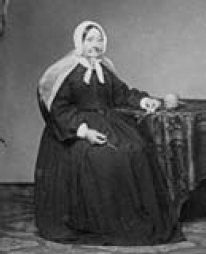
Helen Macdonald in the 1860 s. Hardy and strong, she survived eleven of twelve strokes. Her preferred language was Gaelic.
All that was left to Isabella now was Macdonald himself. Yet the demands of his cabinet portfolio and, at the same time, of ever-mounting difficulties at his law practice kept pulling him away from her. The more he moved away, the more frantically she tried to hold on to him. “She is just putting the finishing stitch to a new waistcoat for me, which I am to sport as a winter vest.” Late in 1848, Macdonald wrote to Margaret Greene to report: “I returned last week from Toronto, my dearest sister, where I had been for the fortnight previous, attending the sittings of the Court of Queen’s Bench,” to find that Isabella “had been practising sitting up for a few minutes daily in my absence in order to be able to surprise me by coming to dinner which she effected. We had our little table brought to her bed room, and there we dined in State.” He would leave the house at nine each morning, returning around six, and he admitted that “her time passes very monotonously out here.”
Isabella did have some duties to occupy herself. “She had as much to do as she is able for, in directing the household affairs, managing her servants etc., and I can assure you, such is her attention and method that confined to the room though she may be, she makes a capital housekeeper,” he told Margaret Greene. Everything was kept neat and tidy, and “my dinner, the great event of each day, about which poor Isa takes the greatest pains, is served up as well as one could wish.” Even when confined to bed day after day, as was increasingly the case, she still struggled to keep connected to him—just. “She is like the ‘Invisible Lady’ that used to exhibit, not ‘show’ herself some years ago,” he told Margaret Greene. “The invisible Lady’s voice orders & behests are heard and obeyed all over the house & are carried out as to cupboards which she never sees & pots & pans that have no acquaintance with her. Not a glass is broken or set of dishes diminished, but she knows of, and calls the criminal to account for.”
Politics, though, kept demanding his attention. He had to go to Montreal, “but not for long,” and yet, “the idea of my going distresses her so much that I would not go, were it not a matter of necessity.”
In a letter Macdonald sent to Margaret Greene in January 1850, he sounds like someone feeling himself pulled apart by horses charging in different directions. “Since September last I have been alone and without a [law] partner,” he wrote. “Isa says I work too hard, & in truth I begin to feel that I do, but like a thief on the treadmill, I must step on, or be dragged.”
Macdonald’s reference to his being without a partner derived from his difficulties with Alexander Campbell.
Macdonald’s constant absences, and the fact that he sometimes dipped into the firm’s funds to cover his political expenses, had made Campbell more and more dissatisfied with their partnership arrangement. Their bank account was overdrawn, and the firm was eighteen hundred pounds in debt. Campbell wrote him crossly, “Your absence from home and your necessities have been I think the main although not by any means the only cause of the annoyances that have arisen.” In reply, Macdonald assured him, “I think I have hit on the only mode by which we can prevent inextricable confusion.” He offered a new arrangement of a fifty-fifty split of all revenues, including those from the Commercial Bank, and the assurance that, “when in Kingston, Macdonald to attend to business.” Campbell initially accepted the arrangement. He wrote reassuringly to Macdonald that he was “anxious that your political career should not be cut short at this point.” Later, Campbell changed his mind. Their partnership was dissolved in September 1849, with Macdonald buying back Campbell’s share for £1,250. Macdonald engaged other partners, but never again one as competent as Campbell. Yet despite their business breakup, Macdonald and Campbell maintained their close political partnership.
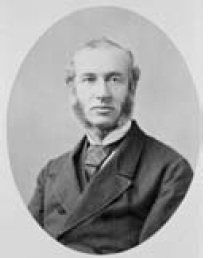
Alexander Campbell, Macdonald’s first law partner, later his political Mr. Fix-It and then a cabinet minister. No one worked more closely with Macdonald for a longer period, but they were never real friends.
In the meantime, Macdonald found himself increasingly pinched for money. “I am more than usually tight now,” he wrote to a friend, reminding him of a debt of “five pounds for books, besides some interest.” In a later letter to another friend he used the expressive phrase “I haven’t got a shilling to jingle on a tombstone.”
Given all the costs Macdonald was covering—Isabella and her servants, his mother, his unmarried sisters, his own expenses—it was no surprise that he should be financially strapped. But he ought not to have been as short of revenues as he in fact was. As a member of the legislature, he’d made useful new business contacts in addition to the networks he’d already developed in Kingston and Montreal, and extended across the Atlantic to England. His political responsibilities were a major distraction, but the root cause of his money problems was that he simply wasn’t a very good businessman. A friend and fellow Conservative, the Hamilton businessman Isaac Buchanan, once wrote in affectionate censoriousness, “I would not have supposed it possible that a man of so much intellect and general versatility could on this one matter [finance] be such a child.” No doubt he was exasperated as well as amused by Macdonald’s overconfidence in his financial capabilities, as when he wrote to Buchanan, who was himself highly successful, “I thoroughly understand that business and can invest without chance or risk of loss.” In truth, Macdonald never applied himself consistently to the task. There was something of his father in him: he was much the smarter and the more purposeful, but in financial matters he too was dreamy and, in the end, not at all as interested in making money as in spending it.
By this time, Macdonald had undergone one other major change in his circumstances. In the election held early in 1848, he won easily in Kingston, but the Conservatives were voted out of office and lost half their members.*41 A new Reform government took office, run jointly by Baldwin and LaFontaine. Macdonald and his colleagues were beached on the Opposition benches.

For a time, there was a real possibility that Macdonald would never get back to the government side of the chamber, or even to the chamber itself. In August 1849 the Kingston Chronicle ran a story that he had made up his mind to resign, and it went on to speculate about possible successors. Two days later the anonymous author of a letter to the newspaper called on fellow Conservatives to persuade Macdonald to stay. Throughout his long career, Macdonald regularly mused out loud about resigning, and sometimes specifically threatened to do so. Most times he did this to discipline his supporters or to vent his own frustrations. On this occasion, he may well have meant it. Campbell, in a letter written to him several years later, referred to these times: “You will remember that throughout your long and apparently hopeless opposition [1848 to 1854] I always deprecated your retiring from parliament, as you often threatened to do.” A threat made to someone as close to him as Campbell was almost certainly a serious one; it’s entirely possible that Campbell leaked the information to the Chronicle to head him off—as it turned out, successfully.
Macdonald’s political letters during this period provide indirect evidence that he was serious about quitting. Almost always, they brim with mischievousness, energy and guile, such as when he recommends arguments that candidates could use on the stump and then dismisses his own concoctions as “bunkum arguments.” But most of the political observations he made to correspondents through the late forties and early fifties are bland and routine. Their tone was that of someone disengaged from what he was doing.
In the end, despite the vacillations, Macdonald decided to remain a full-time politician. Somehow, along with his work, he would juggle both his family responsibilities and his financial obligations. He described his political strategy as playing “the long game.” He was resilient, tenacious, indefatigable. As he said in one speech, “If I don’t carry a thing this year, I will next.” His favourite phrase for minimizing setbacks and miscalculations was the old saying “There’s no use crying over spilt milk.”
So he continued to play the long game. Macdonald remained an active local member, lobbying for legislation to benefit home-town institutions such as Queen’s University, Regiopolis College and the Kingston Hospital. His reward was a repeat victory in the 1851 election, his third in a row, not only for himself but this time also for three other Conservative candidates in the surrounding Mid land District. He had earned, now, not just a local but a regional base. That the Reformers continued their hold on power, and the Conservatives did poorly elsewhere, only increased his stature.

At this same time, he began gathering around him one of the most useful of all political assets—a stable of close friends who would be reliable, long-term allies. Campbell functioned as Macdonald’s local campaign manager and as a general “fixer” throughout Upper Canada, recruiting candidates, handling election funds, distributing patronage to pro-Conservative newspapers. Another member of Macdonald’s Kingston mafia was Henry Smith, a fellow lawyer who had helped him found Kingston’s Cataraqui Club “for the discussion (under proper restrictions) of the various subjects which ought to interest society.” They were so close that Macdonald asked Smith to intervene for him in an “affair of honour” arising from a nasty exchange in the House with an opposing member—an episode that could have led to a duel between them.
The most important member of the network that Macdonald was building systematically was a fellow Scot, John Rose. After earning a degree at the University of Edinburgh, he had immigrated to Montreal in 1836. There, Rose quickly became one of city’s leading corporate lawyers; later he moved to London, England, where he became an insider in financial and political circles, serving on two royal commissions, and, as a friend of the Prince of Wales, a society leader. Although fascinated by the political game, Rose was only twice, briefly, an active politician in Canada, as a junior minister in 1857 and, for two years, as Macdonald’s first post-Confederation finance minister. They respected each other’s intelligence and enjoyed flouting convention; once, while young, they crossed the border and pretended to be strolling entertainers, Rose as a bear and Macdonald playing some instrument. Mac donald’s secretary, Joseph Pope, reckoned that of all his intimates, “personally, he was most attracted to Rose.”
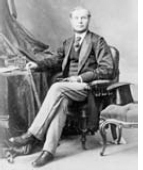
John Rose, a highly successful Montreal lawyer who became a substantial financial and social figure in London. He and Macdonald were exceptionally close, intellectually as well as personally.
Ogle Gowan was another important member of the network, though in a very different way: with him came votes. Gowan was the grand master of the Orange Lodge. In hindsight, those Orangemen are seen today as anti-Catholic and anti-French fanatics. Many were. Many, though, joined only for the business and social contacts the lodge provided. Gowan himself was a moderate. He forged an alliance with Irish Catholics in Upper Canada and lost his position when hard-liners decided he had “sold out to the Pope.” It was only after Gowan’s defeat as grand master that the organization took on its full anti-French colour. He and Macdonald became friends in the mid-1840s when they were working together to replace Family Compact Tories with moderate Conservatives, largely because the old Tories looked down on Orangemen as not respectable. Nevertheless, Macdonald always held Gowan at a certain distance and never gave him the high-level government posts he sought. Their friendship ended in 1862 when Gowan was charged with the rape of a serving girl: although he was acquitted, his political career was ended. Macdonald’s last contact with Gowan was to appoint him to the minor post of inspector of money orders in the post office.
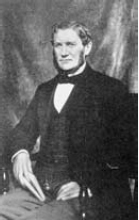
Ogle Gowan. As grand master of the Orange Lodge—a moderate later pushed out by hard-liners—he brought to Macdonald the greatest of all political assets: votes.
Quite different was another Gowan, James Gowan, a cousin, who, when appointed to the bench in 1843, was the youngest judge in the British Empire. Sophisticated, intelligent and an outstanding judge, although refusing all promotions (during his long career on the bench only two of his judgments were overruled), Gowan exchanged letters with Macdonald over the decades on everything from politics to literature. Near the end of his life, Macdonald appointed Gowan to the Senate, where, although nominally a Conservative, he functioned as an independent.

Macdonald gave at least one strong signal that he still wasn’t really committed to politics. At the close of the 1840s, Canadian politics were dominated by a crisis that touched directly on the subject that most commanded Macdonald’s heart—Canada’s connection to Britain. Yet he had almost nothing to say about this defining issue.
In the mid-1840s, the British prime minister, Robert Peel, adopted free trade. One objective was to reduce the cost of importing food, so as to help the starving Irish through the potato famine. The main reason was that Manchester free-traders such as Richard Cobden and John Bright had won the argument that Britain, as the world’s leading economy, would gain by opening wide its doors to raw materials while exporting its cornucopia of manufactured goods.*42 No nation was more affected by the abandonment of Imperial Preference than Canada. Within a few years, all the protective tariffs that subsidized its exports to Britain—principally of lumber and flour—vanished. A few years later the Navigation Laws, which gave an advantage to colonial shipping, were repealed. Wheat exports dropped by more than 50 per cent, and flour exports by 40 per cent. Cheaper and better wood began to be shipped to Britain from the Baltic. In 1849 Governor General Elgin estimated that “property in most Canadians towns, and most especially in the capital [Montreal], has fallen 50 percent in value…three-fourths of the commercial men are bankrupt.”
Across Canada there was widespread anger and a sense of abandonment. To magnify this discontent, the Imperial government had refused the demands of Tory Conservatives to disallow a Rebellion Losses Bill introduced by the co-premier, LaFontaine. The bill provided compensation for property damaged during the Rebellion of 1837–38, and many of the beneficiaries would be those Lower Canadians who had actually rebelled against the Crown. On April 25, 1849, riots instigated by local Conservatives broke out in Montreal. That night, the rioters (all of them English-speaking) broke into the Parliament Buildings and put them to the torch; the buildings were burned to the ground, and almost all the books and collections in the parliamentary library were destroyed.
In response, Montreal businessmen and financiers organized a petition condemning British policy. Eventually, the document carried more than one thousand signatures, among them two Redpaths, three Workmans, two Molsons, a future prime minister (John Joseph Abbott) and three future cabinet ministers of Canada. In October, a mass meeting in Montreal approved a manifesto calling for “a friendly and peaceful separation from the British connection and a union upon equitable terms with the great North American Confederacy of Sovereign States”—in other words, for annexation.
Macdonald kept almost completely silent about this direct challenge to the British connection, though he helped to organize a meeting in Kingston of a new British America League. After roundly rejecting annexation, the league argued instead for some form of reciprocity pact or cross-border free-trade deal with the United States to replace the lost British market. The Kingston meeting attracted few other leading politicians, excepting Macdonald, a home-towner. He did not make a speech or play any role in drafting the communiqué. By the time the league ceased to function, towards the end of 1850, Macdonald had already cut his association with it.
In fact, with the ending of a worldwide depression in 1850, most of the lost prosperity quickly returned. Montreal businessmen and financiers abandoned their temporary interest in protest and transferred their allegiance to the cause of reciprocity with the United States. Elgin exercised some brilliant diplomacy to arrange a pact between the two countries in 1854. The real political significance of what had happened was that during the turmoil Macdonald had scarcely stirred.

Two factors may have caused Macdonald to make up his mind sometime in the early 1850s that politics, and not the law, would be his life’s work. The first was that, late in 1849, Isabella told him a second miracle was about to occur in their married life: although now forty years old, she was pregnant again. On December 9, 1849, Macdonald informed Margaret Greene, with mixed hope and fear, that “Isa views her coming trials with great fortitude & from her courage & patience I have every hope of a happy issue. Still she prepares for the worst.” A month later, he reported that “all arrangements have long been made, and she now awaits for the issue with patience and fortitude. She has given me many directions about herself and her offspring, which any evil happen, & having done all that she can do, is now content.” But Macdonald was not able to focus only on his wife and unborn child. A fortnight earlier, he told his sister-in-law in another letter that his mother, following yet another couple of attacks, was “perfectly resigned to her probable fate and sudden exit.”
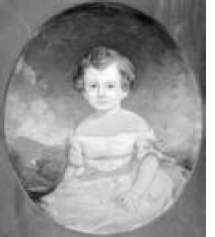
Hugh John as a baby, c. 1852. He was the only child of Macdonald and Isabella to survive. His mother was too ill to care for him, and he and Macdonald later became estranged. The artist is Sawyer.
By early February 1850, Mac donald was writing that Isabella’s “immediate confinement is much to be desired, this continuance of suffering wears down her strength.” A few days later he reported again that “the struggle has exhausted her very much, but she has kept up her spirits.” Finally, on March 13, 1850, Macdonald declared in triumph, “We have got Johnnie back again, almost his image.” The baby was less “delicate” than the brother he would never meet, but “born fat & coarse.” He was called Hugh John, names that connected him to both his father and his grandfather.
The second explanation for Macdonald’s decision about his career was that, sometime early in the decade, he realized that he could get right to the top. He was, still, a relatively new guy, and he had at last begun to frame in his mind a genuinely new idea. As well, his mother, still watching over him despite her repeated strokes, had always told him that he was destined one day to be “more than an ordinary man.”